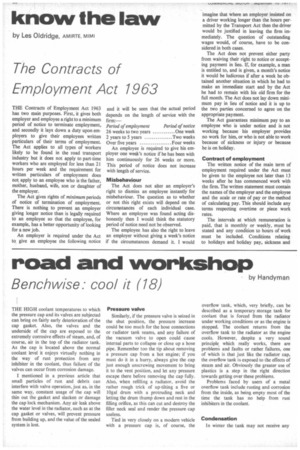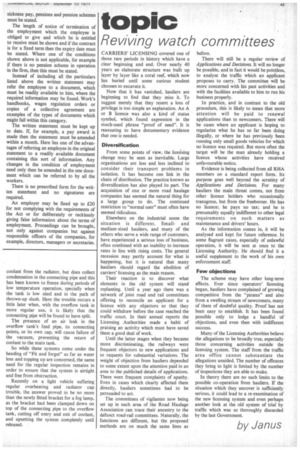know the law
Page 46

Page 47

If you've noticed an error in this article please click here to report it so we can fix it.
by Les Oldridge, AMIRTE, MIMI
The Contracts of Employment Act 1963
THE Contracts of Employment Act 1963 has two main purposes. First, it gives both employer and employee a right to a minimum period of notice to terminate employment, and secondly it lays down a duty upon employers to give their employees written particulars of their terms of employment. The Act applies to all types of workers likely to be found in the road transport industry but it does not apply to part-time workers who are employed for less than 21 hours per week and the requirement for written particulars of employment does not apply to an employee who is the father, mother, husband, wife, son or daughter of the employer.
The Act gives rights of minimum periods of notice of termination of employment. There is nothing to prevent an employer giving longer notice than is legally required to an employee so that the employee, for example, has a better opportunity of looking for a new job.
An employer is required under the Act to give an employee the following notice and it will be seen that the actual period depends on the length of service with the firm:— Period of employment Period of notice 26 weeks to two years One week 2 years to 5 years Two weeks Over five years Four weeks An employee is required to give his employer one week's notice if he has been with him continuously for 26 weeks or more. This period of notice does not increase with length of service.
Misbehaviour The Act does not alter an employer's right to dismiss an employee instantly for misbehaviour. The question as to whether or not this right exists will depend on the circumstances of each individual case. Where an employee was found acting dishonestly then I would think the statutory period of notice need not be observed.
The employee has also the right to leave an employer without giving a week's notice if the circumstances demand it. I would imagine that where an employer insisted on a driver working longer than the hours permitted by the Transport Act then the driver would be justified in leaving the firm immediately. The question of outstanding wages would, of course, have to be considered in both cases.
The Act does not prevent either party from waiving their right to notice or accepting payment in lieu. If, for example, a man is entitled to, and is given, a month's notice it would be ludicrous if after a week he obtained another situation in which he had to make an immediate start and by the Act he had to remain with his old firm for the full month. The Act does not lay down minimum pay in lieu of notice and it is up to the two parties concerned to agree on the appropriate payment.
The Act guarantees minimum pay to an employee who is under notice and is not working because his employer provides no work for him, or who is not able to work because of sickness or injury or because he is on holiday.
Contract of employment The written notice of the main term of employment required under the Act must be given to the employee not later than 13 weeks after he has commenced work with the firm. The written statement must contain the names of the employer and the employee and the scale or rate of pay or the method of calculating pay. This should include any terms respecting overtime or piece work rates.
The intervals at which remuneration is paid, that is monthly or weekly, must be stated and any condition to hours of work must be included. Conditions relating to holidays and holiday pay, sickness and sickness pay, pensions and pension schemes must be stated.
The length of notice of termination of the employment which the employee is obliged to give and which he is entitled to receive must be shown and if the contract is for a fixed term then the expiry date must be stated. Where one of the conditions shown above is not applicable, for example if there is no pension scheme in operation in the firm, then this must be stated.
Instead of including all the particulars listed above the written statement may refer the employee to a document, which must be readily available to him, where the required information may be found. Work's handbooks, wages regulation orders or copies of a collective agreement are examples of the types of documents which might fall within this category.
The written statement must be kept up to date. If, for example, a pay award is made then the statement must be amended within a month. Here lies one of the advantages of referring an employee in the original statement to a readily available document containing this sort of information. Any changes in the condition of employment need only then be amended in the one document which can be referred to by all the workers.
There is no prescribed form for the written stateMent and no signatures are required.
An employer may be fined up to £20 for not complying with the requirements of the Act or for deliberately or recklessly giving false information about the terms of employment. Proceedings can be brought, not only against companies but against responsible officers of the companies, for example, directors, managers or secretaries.




























































































